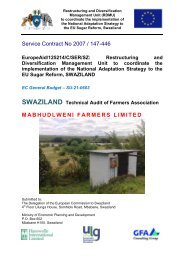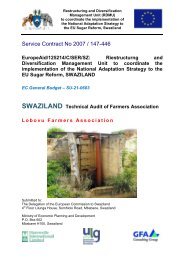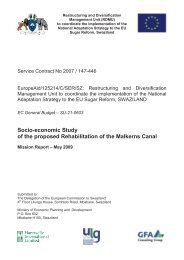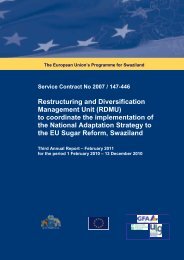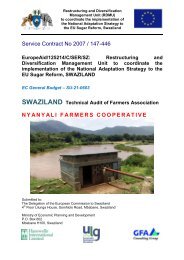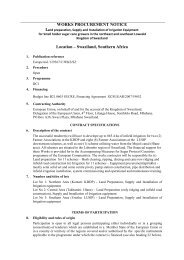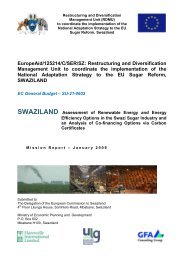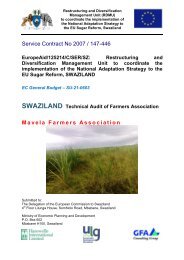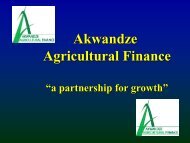Service Contract No 2007 / 147-446 Strategic ... - Swaziland
Service Contract No 2007 / 147-446 Strategic ... - Swaziland
Service Contract No 2007 / 147-446 Strategic ... - Swaziland
- No tags were found...
Create successful ePaper yourself
Turn your PDF publications into a flip-book with our unique Google optimized e-Paper software.
Annex 5: Stakeholder engagement methodologyScoping phaseStakeholder engagement is a key component of the StrEA. During the Scoping Stagebilateral consultations were carried out with some of the key stakeholders (see list in Annex3) including stakeholders from Government institutions, parastatals, professionalorganisations, the private sector and NGOs. The aim of the bilateral interviews was to clarifyuncertainties with regards to the scope and intentions of the NAS and relevant policies andregulations, as well as to start gathering concerns with regards to the environmentalperformance of the sugar sector in <strong>Swaziland</strong> and the potential environmental implications(positive and negative) of implementing the NAS.Due to time limitations, and sometimes unavailability of persons, interviews could not be heldwith certain stakeholders at the scoping stage. These included: Roads Department, theDepartment of Water Affairs, Ministry of Health and Yonge Nawe (environmental NGO).These key stakeholders will nevertheless be targeted for bilateral consultations during theStrEA Study phase.To complement the bilateral interviews during scoping, a site visit was made to the LUSIPand KDDP areas.StrEA Study phaseFor the StrEA Study stage, stakeholder engagement took place according to a combinationof:Bilateral interviews with certain key stakeholders from Government institutions, parastatals,professional organisations, civil society, NGOs and the private sector. These included keystakeholders not interviewed during the scoping stage, as well as other interviews identifiedas necessary.Stakeholders’ Workshop to which key stakeholders were invited (see Annex 7 for the list ofparticipants), with the aim of exploring more in-depth the key aspects identified andalternative measures to minimise negative effects and optimise positive ones. The workshoptook place on 15 April in Manzini, and background material (summary of the scoping reportand agenda) were circulated beforehand to participants. The workshop agenda is presentedin Annex 8 below.The workshop followed a ‘World Café’ format, which allows all participants to engage indiscussions on each key aspect in a small group format. The ‘world café’ format consists ofmaking general presentations of the key issues under discussion (in plenary) and the splittingin thematic tables. Each table discusses one key issue and has one facilitator; discussionslast for approximately 15-20 minutes. After the initial 15-20 minutes are over, participantschange tables, and discuss based on the preliminary findings of the previous group. Thisallows all participants to discuss all (or most) key issues in small groups; people that may notbe inclined to contribute in plenary discussions dominated by a few voices, will normally beable to better contribute in smaller groups. Facilitators then synthesise discussions andfindings and present them at the end of the day.Site visits – site visits during the SEA Study phase included: Ubombo Sugar estate and mill,KDDP development areas and a Farmers Association in the Big Bend area. These site visitswould be complemented with interviews to stakeholders.RDMU (<strong>Strategic</strong> Environmental Assessment of the National Adaptation Strategy) - Page 173



